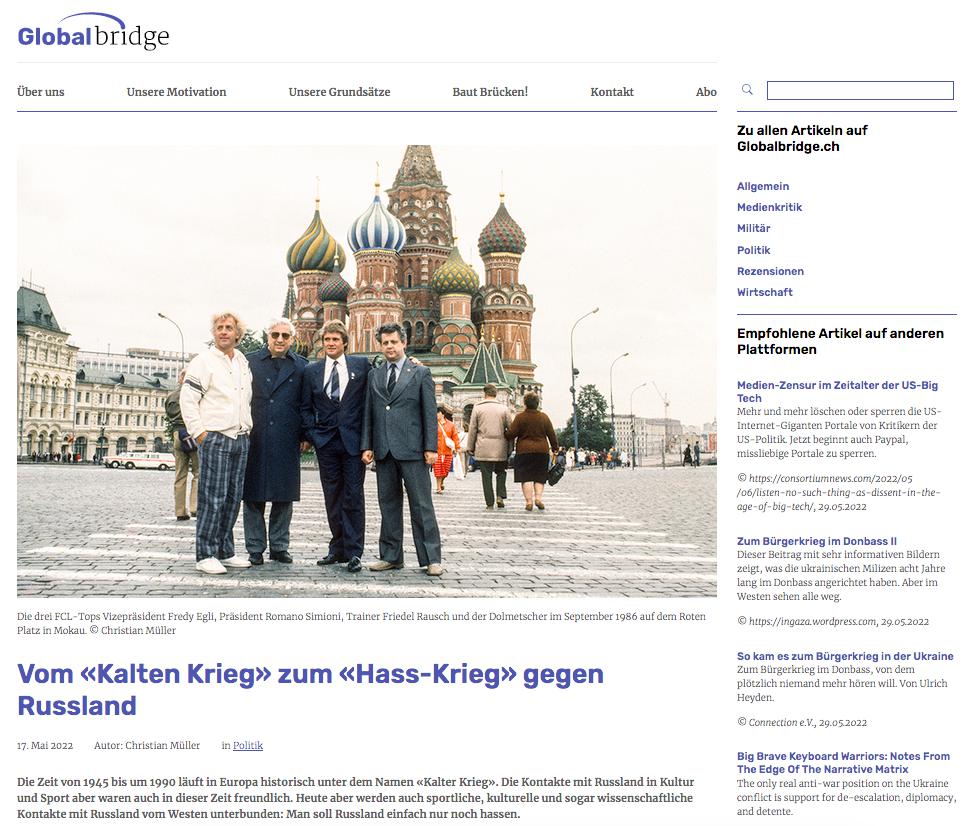From the “Cold War” to the “Hate War” against Russia
by Christian Müller, Switzerland
The period from 1945 to around 1990 is historically known in Europe as the “Cold War”. However, contacts with Russia in culture and sport were also friendly during this period. Today, however, sporting, cultural and even scientific contacts with Russia are prevented by the West: Russia is simply to be hated.
On 8 May 1945 – in Moscow it was already 9 May – Nazi Germany surrendered unconditionally. This formally ended the Second World War, even though fighting continued in various regions of the world. Germany was divided into four zones, and these were allocated to the four victorious powers: The Soviet Union, the USA, Great Britain and France. But mainly because of the different economic systems - capitalism in the West, communism in the Soviet Union – massive tensions remained between the victorious powers. It was the time of the so-called "Cold War", which also became visible in considerable travel restrictions from 13 August 1961 with the building of the Berlin Wall.
Nevertheless, people communicated with each other and had contacts, not least in the areas of sport and culture. In Switzerland, for example, there were concerts by the Don Cossack Choir under Serge Jaroff, and I myself went to a concert in Baden (Aargau) by the absolutely fantastic Slovak singer Hana Hegerová. And vice versa: I myself accompanied my friend, the musician André Jacot, with his string quartet to Prague and Warsaw in 1972, where the quartet gave concerts.
But I have also good memories of my first trip to Moscow, back in 1986 during the Cold War. I was editor-in-chief of the “Luzerner Neusten Nachrichten” (LNN) at the time, and we were the sponsors of the Lucerne FCL football club with the unforgettable “See LNN” jerseys. As FCL had a UEFA Cup match against Spartak Moscow on 17 September 1986, Friedel Rausch, FCL’s coach at the time, decided to attend a Spartak vs. Dnieper match in Moscow two weeks before this Cup match to study Spartak's style of play and tactics in order to increase FCL's chances of winning. The then FCL president Romano Simioni and vice-president Fredy Egli travelled with him – and so did I as an interested media man. At that time, it was still not possible to fly from Zurich to Moscow. We had to take the train to Paris in order to catch a flight to Moscow. And in Moscow, where we had an interpreter, we naturally went to see the city.
Today, sporting and cultural contacts with Russia are deliberately prevented
To stay with football: The European Football Union UEFA has decided that Russia will not be allowed to participate in the Nations League and the Women’s European Championship, and Russia will also no longer be allowed to apply to host the European Championships in 2028 and 2032 – more than ten years from now! And to return to culture and Lucerne: “Lucerne Festival” has cancelled for political reasons the two concerts of the “Mariinskyi Orchestra” with the Russian conductor Valery Gergiev on 21 and 22 August 2022.
Today, even concerts in which compositions by the Russian composer Peter Tchaikovsky (1840–1893) are on the programme are cancelled. And the University of Milano-Bicocca even wanted to ban a lecture by the Italian poet Paolo Nori on the Russian poet Fyodor Dostoevsky (1821–1881), but then had to back out.
Needless to say, that the “International Cat Federation” has banned cat show organisers from showing Russian cats. Which, if it wasn't enough to make you cry, would at least make you laugh. But what if the European Association of Scientists and Doctors engaged in Research on Combating Cancer with Radioactive Irradiation - “European Association of Nuclear Medicine” EANM - expelled the Russian association? Also a laughing matter? (Perhaps it is no coincidence that the current president of this association, Dr Jolanta Kunikowska, is a Polish woman).
Not only all these cancellations and bans, now music is even misused for political propaganda
Music is the only “language” that is understood around the world and can also bring together people from very different cultural backgrounds. But it is not enough that music by Russian composers or with Russian musicians is now blocked wherever possible. Now music is even being used the other way round to make political propaganda. At the Eurovision Song Contest ESC on 14 May in Turin in Italy, where Russia was also excluded, not the musically best participants won, as predicted by political observers, but simply the Ukrainian band “Kalush Orchestra” – as a sign of the millions of TV viewers’ solidarity with Ukraine. How right the music journalist Stefan Künzli was who wrote the following sentence on 30 April 2022: “The Eurovision Song Contest was brought into being during the Cold War. To promote European cohesion. Now the Russian war of aggression has a firm grip on the contest. The once peaceful song contest is becoming a farce.”
There was the Cold War from 1945 to 1991. What is going on now is not just Cold War 2.0, it is the – new – Russophobia war. How important and how beautiful it would be if we could and were allowed to hear the Russian poet and chansonnier Bulat Okudschawa even today – even in the West: “Get your coat. It’s time to go home.” •
Source: www.globalbridge.ch of 17 May 2022;
with friendly permission by the author
cc. Christian Müller (*1944) is a Swiss journalist and book author. He studied history and constitutional law at the University of Zurich and, having already been very involved in journalism, graduated in 1974 with a dissertation on social history. He then worked for 35 years as an editor and editor-in-chief of various Swiss daily and weekly newspapers as well as in media management and media consulting, some years of which he also spent in the Czech Republic. As a journalist, he travelled to more than 50 countries, i.e., in America, Africa, Australia/New Zealand and China, always with a special focus on the cultural characteristics of the respective countries and their social conditions.
Since 2009, he has again worked exclusively as an independent journalist with a focus on West-East tensions and other geopolitical topics. As a journalist, he has closely followed the West-East conflicts of the last 30 years.
He lives alternately in Switzerland, Italy and the Czech Republic.
Globalbridge
In March 2022, Christian Müller founded the politically and financially independent platform “Globalbridge” in order, according to his own statement, “to do something against the hatred in this world within the bounds of what is possible for us, to call on people to talk to each other instead of accusing each other or even shooting at each other. The unspeakable amount of money spent internationally on military armament must be diverted into mutual understanding and balance between rich and poor. We must learn to accept those of different faiths and opinions and to live together peacefully with or without borders.”
On “Globalbridge”, the interested reader will find a rich selection of well-researched contributions on current international events. Christian Müller: “Geopolitics [has] become too much out of the focus of the big media. And where it is still or again a topical issue, the view is frighteningly one-sided – one-sided from NATO’s point of view.”
Make up your own mind: globalbridge.ch

